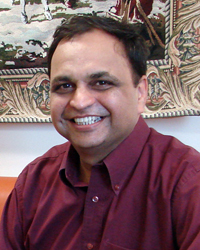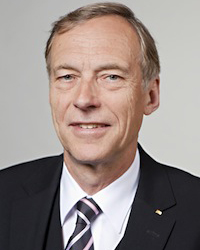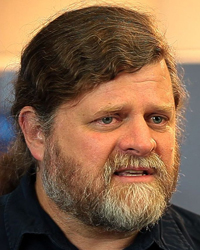Keynote Presentations
Wednesday, August 28, 2013, 9:30-10:30
Alok Choudhary - Northwestern University, USA
Big Data, Exascale Systems and Knowledge Discovery – The Next Frontier for HPC [PDF]
Abstract. Knowledge discovery in science and engineering has been driven by theory, experiments and by large-scale simulations on high-performance computers. Modern experiments and simulations involving satellites, telescopes, high-throughput instruments, sensors, and supercomputers yield massive amounts of data. The world, including social communities, is creating massive amounts of data at an astonishing pace. Just consider Facebook, Google, articles, papers, images, videos and others. But even more complex is the network that connects the creators of data. Altogether these are termed as BIG DATA. This represents a significant and interesting challenge for HPC and opens opportunities for accelerating knowledge discovery. Processing, mining and analyzing this data effectively and efficiently will be a critical component of the knowledge discovery process, as we can no longer rely upon traditional ways of dealing with the data due to its scale and speed. Interestingly, an exascale system can be thought of as another instrument generating “big data”. But unlike most other instruments, such a system also presents an opportunity for big data analytics. Thus the fundamental question is - what are the challenges and opportunities for exascale systems to be an effective platform for not only performing traditional simulations, but for them to be also suitable for data-intensive and data driven computing to accelerate time to insights? That has implications on how computing, communication, analytics and IO are performed. This talk will address these emerging challenges and opportunities.
 Biography. Alok Choudhary is a John G. Searle Professor of Electrical Engineering and Computer Science and a professor at Kellogg School of Management. He is also the founder and CEO of Voxsup Inc., a big data analytics and social media marketing company. He received the National Science Foundation's Young Investigator Award in 1993. He has also received an IEEE Engineering Foundation award, an IBM Faculty Development award, an Intel Research Council award. He is a fellow of IEEE, ACM and AAAS. His research interests are in high-performance computing, data intensive computing, scalable data mining, computer architecture, high-performance I/O systems and software and their applications. Alok Choudhary has published more than 400 papers in various journals and conferences and has graduated 30 PhD students. Techniques developed by his group can be found on every modern processor and scalable software developed by his group can be found on most supercomputers. Alok Choudhary’s work has appeared in many traditional media including New York Times, Chicago Tribune, The Telegraph, TV channels such as ABC, PBS and many international media outlets all over the world.
Biography. Alok Choudhary is a John G. Searle Professor of Electrical Engineering and Computer Science and a professor at Kellogg School of Management. He is also the founder and CEO of Voxsup Inc., a big data analytics and social media marketing company. He received the National Science Foundation's Young Investigator Award in 1993. He has also received an IEEE Engineering Foundation award, an IBM Faculty Development award, an Intel Research Council award. He is a fellow of IEEE, ACM and AAAS. His research interests are in high-performance computing, data intensive computing, scalable data mining, computer architecture, high-performance I/O systems and software and their applications. Alok Choudhary has published more than 400 papers in various journals and conferences and has graduated 30 PhD students. Techniques developed by his group can be found on every modern processor and scalable software developed by his group can be found on most supercomputers. Alok Choudhary’s work has appeared in many traditional media including New York Times, Chicago Tribune, The Telegraph, TV channels such as ABC, PBS and many international media outlets all over the world.
Thursday, August 29, 2013, 9:00-10:00
Arndt Bode - Leibniz Supercomputing Centre and Technische Universität München, Germany
Energy to solution: a new mission for parallel computing [PDF]
Abstract. A short historical overview on the research goals in parallel and distributed computing during the past 40 years is given. "Energy to solution" is a new important area in research and development, dictated by the wish for a green environment and the necessity of avoiding excessive energy bills for modern supercomputers. The talk gives an overview on the contributing parameters: energy efficient data center infrastructure, computer architectures, system software and tools as well as efficient algorithms. It reports on first results in the context of SuperMUC at LRZ.
 Biography. Prof. Dr. Arndt Bode is a full professor for Informatics at Technische Universität München since 1987, leading a research group for computer architecture and parallel and distributed computing. Since October 2008 he is also heading the Leibniz Supercomputer Centre of the Bavarian Academy of Sciences and Humanities in Munich. From 1999 to 2008 he was Vice President and CIO of Technische Universität München. He is author of more than 200 publications on parallel and distributed architectures, programming tools and applications.
Biography. Prof. Dr. Arndt Bode is a full professor for Informatics at Technische Universität München since 1987, leading a research group for computer architecture and parallel and distributed computing. Since October 2008 he is also heading the Leibniz Supercomputer Centre of the Bavarian Academy of Sciences and Humanities in Munich. From 1999 to 2008 he was Vice President and CIO of Technische Universität München. He is author of more than 200 publications on parallel and distributed architectures, programming tools and applications.
Friday, August 30, 2013, 14:30-15:30
Tim Mattson - Intel Corporation, USA
Recent developments in parallel programming: the good, the bad, and the ugly [PDF]
Abstract. As hardware developments have made parallel computers nearly ubiquitous and "big data" has given us the killer app we need to make all this parallel hardware matter, the software world has responded with new and updated standards to support parallel programmers. In this talk, we will discuss three important developments; the soon to be released next version of OpenCL, the memory model in C++'11, and the combinatorial BLAS for graph analytics. I leave it to the audience to assign each of these to the appropriate categories "the good", "the bad" and "the ugly".
 Biography. Tim Mattson is a principle engineer in Intel's Microprocessor and Programming Research laboratory. He is an old fashioned application programmer with experience in quantum chemistry, seismic signal processing, and molecular modeling and has used more parallel programming models than he can keep track of. Tim was part of the teams that created OpenMP and OpenCL. Most recently, he has been working on the memory and execution models for the next major revision of OpenCL. Tim has published extensively including the books Patterns for Parallel Programming (with B. Sanders and B. Massingill, Addison Wesley, 2004), An Introduction to Concurrency in Programming Languages (with M. Sottile and C. Rasmussen, CRC Press, 2009), and the OpenCL Programming Guide (with A Munshi, B. Gaster, J. Fung, and D. Ginsburg, Addison Wesley, 2011).
Biography. Tim Mattson is a principle engineer in Intel's Microprocessor and Programming Research laboratory. He is an old fashioned application programmer with experience in quantum chemistry, seismic signal processing, and molecular modeling and has used more parallel programming models than he can keep track of. Tim was part of the teams that created OpenMP and OpenCL. Most recently, he has been working on the memory and execution models for the next major revision of OpenCL. Tim has published extensively including the books Patterns for Parallel Programming (with B. Sanders and B. Massingill, Addison Wesley, 2004), An Introduction to Concurrency in Programming Languages (with M. Sottile and C. Rasmussen, CRC Press, 2009), and the OpenCL Programming Guide (with A Munshi, B. Gaster, J. Fung, and D. Ginsburg, Addison Wesley, 2011).








